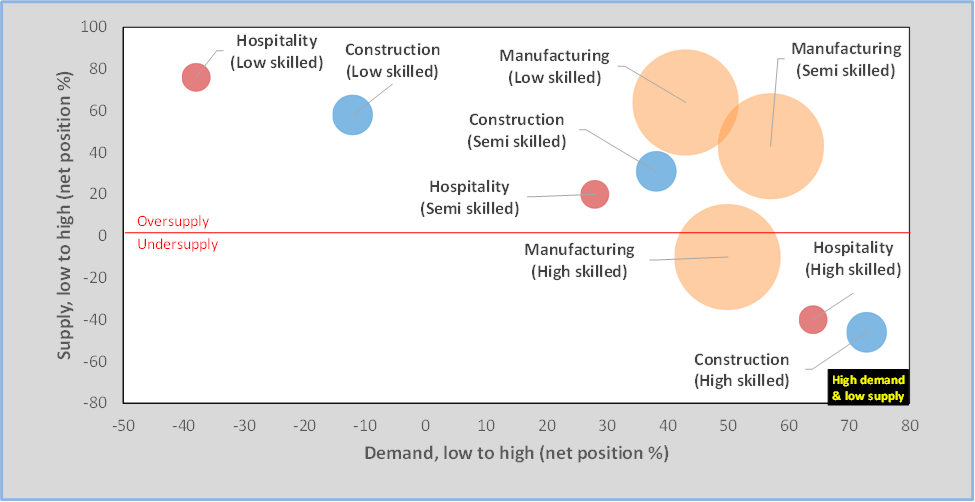Photo: (Airam Dato-on/Unsplash.com)
Over the past 30 years, Viet Nam has experienced rapid economic growth, turning the country from one of the world’s poorest nations into a lower-middle-income country. Recent achievements have resulted in a sizeable shift in employment, from the low-productivity agricultural sector to higher-productivity manufacturing and service sectors. Rapid Asia completed a labour market assessment for IOM in Vietnam to understand the market dynamics better, looking at skills demand and supply and identifying the key sectors that influence employment opportunities.
The demand for skills is rapidly evolving, shifting away from agriculture. Accelerating trends in industrialisation, digital integration and technology advancement have disrupted traditional workforce structures and skills requirements. New skill-intensive jobs emerge across many sectors, including technical, cognitive, and social and behavioural skills (Bodeig et al., 2014). Despite the literacy and numeracy achievements across the Vietnamese workforce, many employers express concerns over a shortage of workers with relevant skills, a significant obstacle to productivity and competitiveness. The study found an apparent ‘skills mismatch’ in three major growth sectors: construction, manufacturing, and hospitality. As shown in Figure 1, the highest level of demand was for high-skilled and semi-skilled labour. Only manufacturing had demand for low-skilled labour. However, there is a significant undersupply of high-skilled labour.

Figure 1: Demand and supply across skill level by sector
The manufacturing sector, with its great demand for low-skilled workers, struggles with turnover. Internal migration is common, as workers seek ways to improve their standard of living. The youth category of low-skilled workers is hard to recruit as there is competition from flexible on-demand work such as motorcycle taxis or courier services.
Across sectors, the skills mismatch is more profound in semi-skilled and high-skilled workers. However, the gap between supply and demand for high-skilled workers is more pressing in the construction and hospitality sectors. There is a strong and increasing demand for workers with digital competencies and soft skills combined with more advanced cognitive aptitude (for example, problem-solving skills). At the same time, evolving market conditions require workers to navigate and anticipate changes in their job.
The response to address this skills mismatch includes investments in education, vocational skills development and improving access to productive resources. However, societal trends and inclusion are factors that significantly impact the synchronisation of supply and demand. Utilising the full potential of the labour market is key for productivity and economic growth. Underlying barriers are blind spots for gender imbalance and lack of capacity building to provide access for marginalised workers.
The future of labour skills in Vietnam places a high value on workers’ adaptability to maintain productivity in the fast-changing economy. On the other hand, workers increasingly adapt to the growing mobility in the market and the access it gives them to other job opportunities. Ultimately, the skills-match gap needs to be effectively addressed to bring together supply and demand. A joint response between institutions, the private sector, and the government is necessary, focusing on targeted vocational development programmes along three dimensions.
- To uplift skill levels of low wage workers.
- To reskill workers with the right skills for occupations in high demand.
- To adapt existing and emerging programmes to ensure inclusive access and relevance for marginalised workers, including women, people with disabilities, ethnic minorities, people in poverty and informal workers.
The full report, Labour Market Assessment: Identifying Opportunities For Vulnerable Vietnamese From Selected Provinces of Viet Nam, can be found here.
About the authors: Daniel Lindgren is the Founder of Rapid Asia Co., Ltd. a management consultancy firm based in Bangkok that specializes in evaluations for programs, projects, social marketing campaigns and other social development initiatives. Nadine Spalburg is an independent consultant working with Rapid Asia as a member of their expert panel of consultants.

